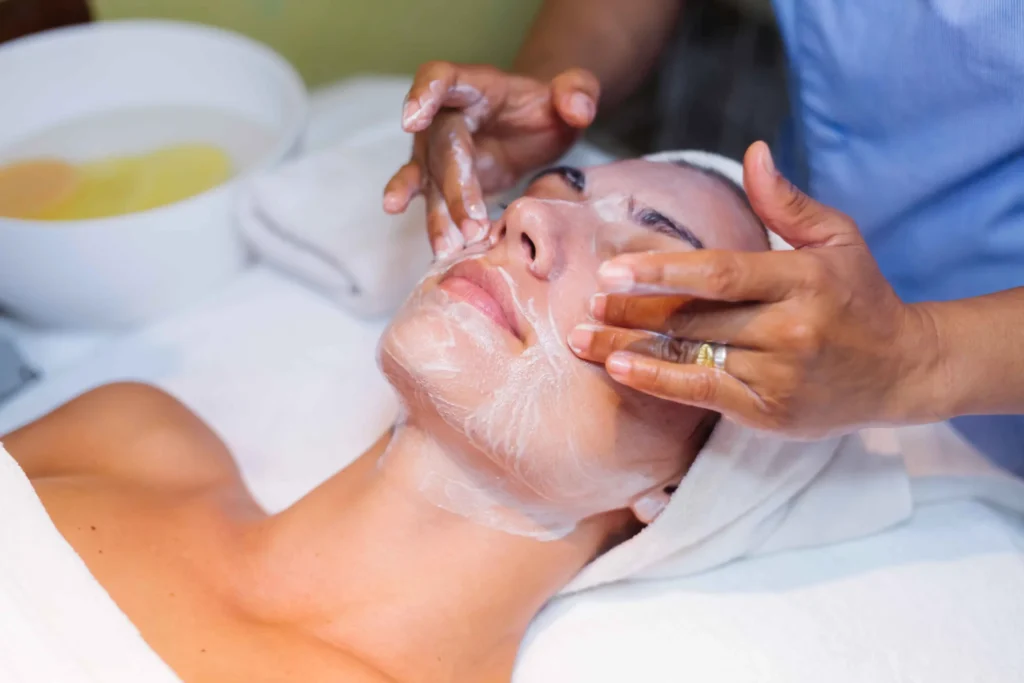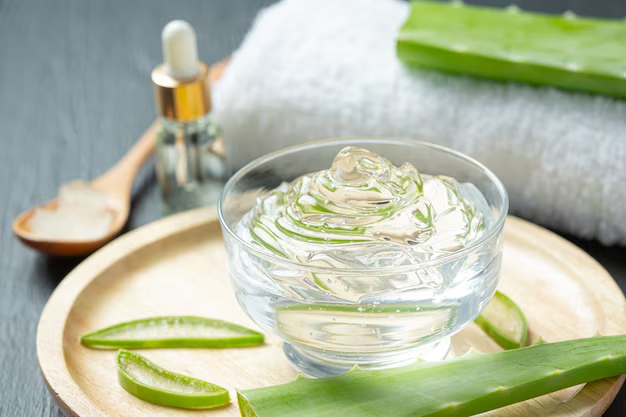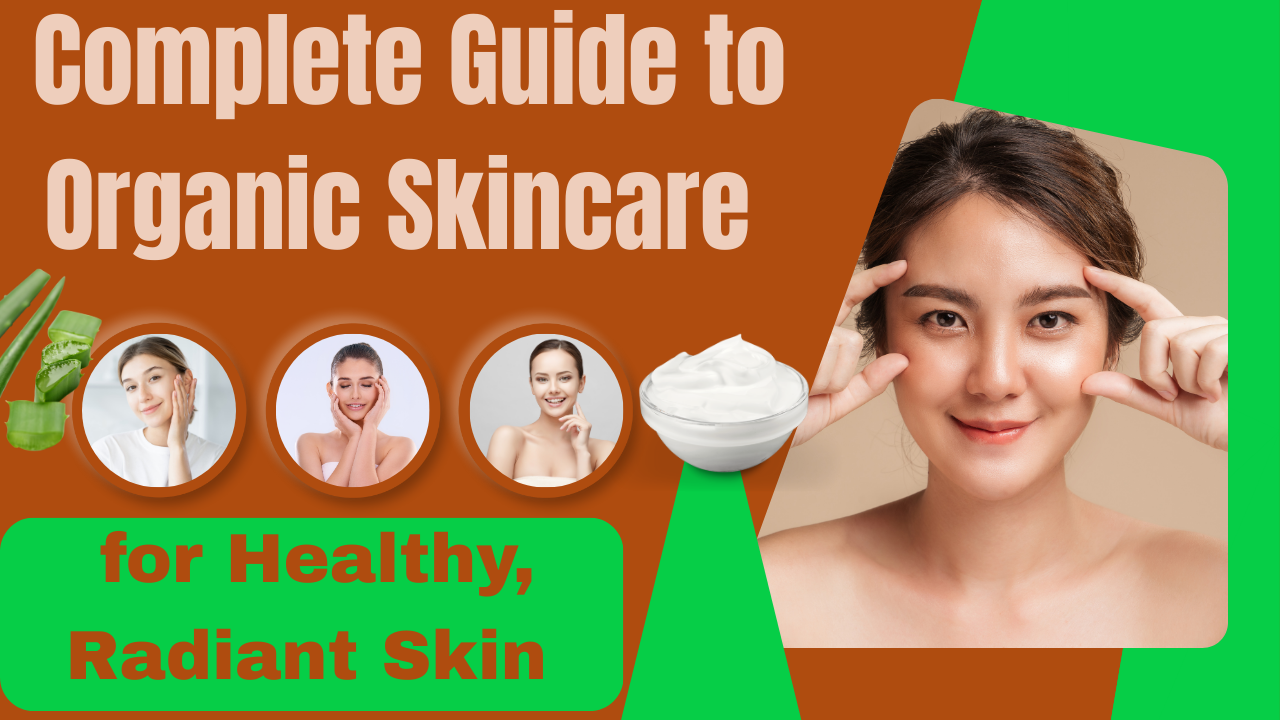In today’s world, people are more aware of the importance of health and sustainability, which has led to a rise in the popularity of organic skincare. From natural cleansers to plant-based serums and chemical-free sunscreens, many are choosing the benefits of nature for glowing, healthy skin. Organic skincare products are made without harsh chemicals, using ingredients that are sourced from nature to nourish and protect the skin.
Organic skincare not only helps in enhancing your skin’s appearance but also contributes to its overall health. These products are packed with antioxidants, vitamins, and essential oils, which work together to hydrate, rejuvenate, and protect your skin from environmental damage. With regular use, organic skincare can lead to a more youthful, radiant complexion.
Choosing organic skincare means embracing a holistic approach to skin health. By focusing on natural, chemical-free ingredients, you can improve your skin’s texture and appearance while also supporting sustainability. Organic skin care is a step toward healthier, more radiant skin in harmony with nature.
Here are 10 Simple Tricks To Improve you Skin With organic skincare:
Section 1: Understanding Healthy Skin
Before we dive into organic skincare, it’s crucial to understand what makes skin healthy.
- The Role of Skin in the Body

The skin is the largest organ of the body, acting as a protective barrier against environmental dangers. It shields the body from harmful elements like UV rays, pollutants, and bacteria.
In addition to protection, the skin plays a vital role in regulating body temperature and managing hydration levels. By producing sweat and adjusting blood flow, the skin helps maintain balance within the body.
Healthy skin is more than just a reflection of good internal health. It’s crucial for overall well-being, supporting vital functions like vitamin D synthesis and serving as the body’s first defense. Taking care of your skin not only improves its appearance but also enhances your health and helps you feel your best.
Characteristics of Healthy Skin
Hydration: The balance of moisture is essential for healthy skin. The outermost layer of the skin, known as the stratum corneum, plays a crucial role in maintaining the skin’s water content. When properly hydrated, the skin appears plump, radiant, and soft. Lack of hydration can lead to dryness, flakiness, and irritation.
Elasticity: Skin’s firmness and its ability to return to its original shape after stretching or movement come from collagen and elastin fibers. These proteins provide structure and resilience to the skin. As we age, the production of collagen and elastin decreases, leading to sagging and the formation of wrinkles.
Even Tone and Texture: Healthy skin displays a smooth, even texture with minimal blemishes, discoloration, or rough patches. It has a balanced skin tone, free from redness, dark spots, or uneven pigmentation. This smoothness and evenness contribute to a youthful and glowing appearance.
Resilience: Properly nourished skin can resist environmental stressors and recover from damage quickly.
Section 2: Core Aspects of Skincare
Regardless of whether you prefer a simple or detailed skincare routine, these essential principles remain crucial. Maintaining hydration, supporting elasticity, and achieving an even skin tone and texture are key to healthy skin, and should be incorporated into any regimen for optimal results.
Cleansing: Cleansing is the first step in any skincare routine, as it removes dirt, oil, pollution, and dead skin cells from the surface. This process helps prevent clogged pores, acne, and dull skin, ensuring a fresh, clean canvas for the next steps in your routine.
Exfoliation: Exfoliating helps to remove dead skin cells and promote cell turnover, leading to smoother, brighter skin. Regular exfoliation can help reduce the appearance of pores and improve skin texture. However, over-exfoliating can strip the skin of its natural oils and damage the protective skin barrier, so it’s important to do it in moderation.
Moisturizing: Moisturizing is key to maintaining the skin’s hydration and protecting its barrier. A well-moisturized skin prevents dryness, flakiness, and inflammation, keeping it soft, smooth, and plump. It also helps to lock in moisture, allowing the skin to retain its elasticity and youthful appearance.
Sun Protection: Sunscreen is essential for protecting the skin from harmful UV rays. These rays accelerate the aging process by causing wrinkles, dark spots, and sagging. Regular use of sunscreen also helps reduce the risk of skin cancer and other sun-related damage.
Targeted Treatments: These include specific products like serums and masks designed to address individual skin concerns, such as acne, hyperpigmentation, or fine lines. Targeted treatments deliver concentrated ingredients directly to the areas that need attention, helping to improve the overall appearance of the skin.
Section 3: The Rise of Organic Skincare
- What is Organic Skincare ?

Organic skincare involves products made from ingredients grown without synthetic fertilizers, pesticides, GMOs, or chemical additives. These products rely on natural, plant-based components that are minimally processed, ensuring that they retain their purest form. Sourced through environmentally sustainable practices, organic skincare offers a healthier, eco-friendly alternative to traditional beauty products. By choosing organic skincare, you’re not only taking care of your skin but also supporting environmentally responsible farming practices that protect the planet and its resources.
- How is it Different from Natural Skincare ?
Natural skincare may contain plant-based ingredients, but it doesn’t necessarily mean those ingredients were grown organically. Organic skincare, on the other hand, ensures that ingredients are sourced from certified organic farming practices, which follow stricter production standards. These products are grown without synthetic fertilizers, pesticides, or harmful chemicals, providing a cleaner, more eco-friendly option. Organic skincare emphasizes minimal chemical interference during both the growing process and production, ensuring that your skincare routine is not only effective but also safer for your skin and the environment.
Common Organic Skincare Ingredients
Aloe Vera: Hydrating and soothing
Chamomile: Anti-inflammatory and calming
Jojoba Oil: Mimics the skin’s natural sebum
Shea Butter: Deeply moisturizing
Green Tea Extract: Rich in antioxidants
Rosehip Oil: Promotes regeneration and brightens the skin
Section 4: Benefits of Organic Skincare
- Free from Harsh Chemicals
Conventional skincare products often contain harsh chemicals like parabens, sulfates, synthetic dyes, and artificial fragrances. These ingredients are known to cause skin irritation and may lead to long-term health issues, such as hormone disruption. Organic skincare, however, avoids these chemicals entirely, offering a safer and more natural alternative for your skin. By using organic products, you reduce exposure to harmful substances that could potentially damage your skin and overall health.

- Gentle on Sensitive Skin
Since organic skincare products steer clear of aggressive chemicals, they are much gentler on the skin. This makes them an ideal choice for individuals with sensitive or reactive skin types, as they are less likely to cause allergic reactions, redness, or breakouts. Organic products, with their natural and soothing ingredients, help calm and nourish the skin, making them a safer option for those who experience irritation from conventional products.
- Environmentally Friendly
Organic skincare is not just good for your skin; it’s also better for the planet. The farming methods used for organic ingredients reduce pollution, conserve water, and avoid the use of harmful chemicals that can leach into soil and water systems. By choosing organic skincare, consumers are supporting sustainable farming practices that minimize environmental damage, making it a more eco-friendly choice for those concerned about the planet’s health.
- Rich in Nutrients
Organic skincare products are often made with unprocessed botanical extracts, which retain higher levels of essential nutrients like vitamins, minerals, and antioxidants. These nutrients nourish, repair, and protect the skin more effectively than heavily processed alternatives. The natural goodness in organic products helps restore the skin’s health, giving it a more vibrant, youthful appearance while addressing various skin concerns.
- Cruelty-Free and Ethical
Many organic skincare brands are committed to cruelty-free practices, meaning they do not test their products on animals. These brands also prioritize sustainable sourcing and recyclable packaging, further aligning their practices with ethical values. By choosing organic skincare, consumers can feel confident that their beauty routines are supporting more responsible and humane practices, all while promoting sustainability and animal welfare.
Section 5: Common Myths About Organic Skincare
Myth 1: Organic Skincare is Less Effective
There’s a common misconception that organic skincare products are less effective than their synthetic counterparts. In reality, many organic products use highly concentrated plant extracts that can provide impressive results, especially with long-term use. These natural ingredients, rich in vitamins, antioxidants, and essential oils, often work in harmony with the skin, helping to address concerns like dryness, irritation, and aging without the use of harsh chemicals. Over time, organic skincare can be just as potent—and sometimes even more effective—than synthetic alternatives.
Myth 2: Organic Means Hypoallergenic
While organic skincare is often gentler on the skin, it’s important to remember that natural ingredients can still trigger allergic reactions in some people. Just because a product is organic doesn’t automatically make it hypoallergenic. Natural substances, such as essential oils, plant extracts, or even certain botanicals, can cause sensitivities in certain individuals. To avoid any adverse reactions, it’s always best to patch test a small amount of product on your skin before applying it fully, especially if you have sensitive or reactive skin.
Myth 3: Organic Products Don’t Last as Long
Another myth surrounding organic skincare is that it doesn’t last as long as conventional products. While it’s true that organic skincare products typically have shorter shelf lives due to the absence of synthetic preservatives, proper care can significantly extend their usability. By storing these products in cool, dry environments away from sunlight and heat, you can preserve their freshness and effectiveness for longer periods. This makes it easier to enjoy the benefits of organic skincare without worrying about premature expiration.
Section 6: Building an Organic Skincare Routine
Here’s a sample organic skincare routine for day and night:
- Morning Routine

Gentle Organic Cleanser – Aloe vera or oatmeal-based
Hydrating Toner – Rose water or witch hazel
Vitamin C Serum – Brightens and protects from free radicals
Moisturizer – Shea butter or jojoba oil-based
Mineral Sunscreen – Zinc oxide with botanical extracts
- Evening Routine
Double Cleanse: Start with an oil cleanser to remove makeup and impurities, followed by a gentle, foaming organic cleanser to deep clean and refresh the skin.
Exfoliation (2-3 times a week): Use organic sugar or enzyme-based scrubs to gently exfoliate and remove dead skin cells, promoting a smoother, brighter complexion.
Night Serum: Apply a nourishing night serum, such as rosehip oil or hyaluronic acid, to hydrate and repair the skin overnight.
Night Cream: Finish with a rich night cream packed with anti-aging organic oils like argan and sea buckthorn to deeply moisturize and support skin regeneration.
Section 7: Organic Skincare for Different Skin Types
Dry Skin:
For dry skin, it’s important to choose organic skincare products that are rich in emollients, which help to lock in moisture and restore hydration. Ingredients like shea butter, avocado oil, and hyaluronic acid are excellent choices. These natural ingredients work to deeply nourish the skin, providing long-lasting moisture and creating a protective barrier to prevent water loss. This helps your skin feel soft, smooth, and more supple, combating the rough, tight sensation that often accompanies dryness.
Oily/Acne-Prone Skin:
Organic skincare can be especially effective for oily or acne-prone skin, as it helps regulate oil production without causing further irritation. Tea tree oil, witch hazel, and aloe vera are all powerful ingredients that naturally balance the skin’s oil levels. Tea tree oil has antibacterial properties, which can help reduce acne-causing bacteria, while witch hazel tightens pores and reduces inflammation. Aloe vera provides soothing hydration, helping to calm any redness or irritation while keeping the skin from becoming excessively oily.
Sensitive Skin:
Sensitive skin requires extra care, so it’s best to opt for organic products that feature calming ingredients. Chamomile, calendula, and oatmeal are all known for their gentle, soothing properties, helping to reduce irritation and redness. These natural ingredients work to nourish and calm the skin, making them ideal for sensitive or reactive skin types. Additionally, it’s crucial to avoid added fragrances—whether synthetic or natural—since they can trigger reactions, even if derived from essential oils, which can be irritating for delicate skin.
Mature Skin:
As we age, our skin needs extra support to maintain its firmness and elasticity. Organic skincare that’s rich in antioxidants like green tea, vitamin E, and rosehip oil can be particularly beneficial for mature skin. Green tea and vitamin E help fight free radical damage, while rosehip oil is known to promote collagen production and improve skin texture. Together, these ingredients help to reduce the appearance of fine lines and wrinkles, giving the skin a more youthful and radiant appearance while promoting overall skin health.
Section 8: Certifications to Look For
Legitimate organic skincare brands often carry third-party certifications:
USDA Organic (United States)
COSMOS Organic (Europe)
Ecocert
Soil Association (UK)
NSF/ANSI 305
These labels ensure the product meets rigorous organic standards.
Section 9: Challenges in the Organic Skincare Industry
Despite its benefits, organic skincare faces some hurdles:
Lack of Regulation:
One challenge with organic skincare is that the term “organic” is not always consistently regulated. Unlike food products, which are strictly controlled, skincare products labeled as “organic” may not always meet the same standards. This lack of clear regulation means that consumers must rely on certification labels and the transparency of the brand regarding their sourcing and ingredients. To ensure a product is truly organic, it’s important to look for recognized certifications and verify the ingredient list to confirm the product’s authenticity.
Higher Cost:
Organic skincare products often come with a higher price tag, primarily because organic farming and production processes tend to be more expensive. These products require more time, effort, and resources to grow without the use of synthetic chemicals or pesticides, which increases production costs. As a result, these costs are passed on to the consumer. While the higher cost can be a downside, many people find the investment worthwhile, as they’re getting safer, more natural ingredients that are better for their skin and overall health in the long run.
Limited Shelf Life:
One of the drawbacks of organic skincare products is their typically shorter shelf life. Since they are free from synthetic preservatives, they are more prone to degradation over time. Without chemical stabilizers, organic products can lose their potency and effectiveness more quickly. This means that proper storage is crucial to maintaining their quality. Keeping these products in a cool, dry place and using them within their recommended timeframe can help extend their usability, ensuring that you get the most out of your investment.
Section 10: DIY Organic Skincare
You can create effective organic skincare products at home using ingredients from your kitchen.
- DIY Face Mask

1 tbsp organic honey
1 tbsp mashed avocado
1 tsp turmeric
Apply for 15 minutes and rinse. This combination hydrates, soothes, and brightens.
DIY Exfoliator
1 tbsp organic sugar
1 tbsp olive oil
Gently massage on skin in circular motions once a week.
Conclusion
As consumers become more health-conscious, the demand for organic skincare continues to grow. Organic products provide a holistic, eco-friendly, and skin-friendly alternative to conventional options. They offer numerous benefits, from improving skin health to aligning with ethical values, empowering individuals to care for their skin naturally and responsibly.
Whether you’re new to skincare or experienced, switching to organic skincare can be a transformative journey that enhances both your complexion and the planet. By choosing brands with transparent ingredient sourcing and certified organic labels, you make a responsible choice for your skin’s health and the environment. Organic skincare supports not only your beauty routine but also a more sustainable and ethical approach to beauty.
FAQs
- Is organic skincare suitable for all skin types ?
Yes, organic skincare can be suitable for all skin types, including sensitive, oily, dry, and acne-prone skin. The key is to choose products with organic ingredients that are specifically formulated for your skin type, such as aloe vera for sensitive skin or tea tree oil for oily skin. - How can I tell if a skincare product is truly organic ?
Look for certifications from reputable organizations like USDA Organic, Ecocert, COSMOS, or the Soil Association. Also, check the ingredient list—truly organic skincare products will list plant-based ingredients with minimal synthetic additives or preservatives. - Can organic skincare really help with anti-aging ?
Yes. Many organic skincare ingredients, such as rosehip oil, green tea extract, and vitamin E, are rich in antioxidants and essential fatty acids that help fight free radicals, improve skin elasticity, and reduce fine lines naturally over time. - Are organic skincare products more expensive than regular ones ?
Generally, yes, due to the cost of organic farming and sustainable practices. However, many people find the investment in organic skincare worthwhile for the benefits of non-toxic ingredients, ethical sourcing, and better long-term skin health. - Do organic skincare products expire faster ?
Yes, most organic skincare products have shorter shelf lives because they lack synthetic preservatives. To maximize their lifespan, store them in a cool, dark place and use them within the recommended period after opening (typically 6–12 months).

